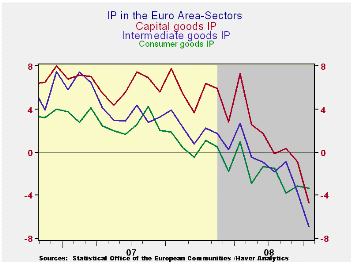 Global| Dec 12 2008
Global| Dec 12 2008Decline is 'Everywhere' !
Summary
The contribution to growth from IP is weakening sharply. The decline in IP, one that is an inflation-adjusted reading, is at a -13.5% rate in Q4. Consumer goods output is the strong sector, oddly enough, falling at a -3.8% pace early [...]

The contribution to growth from IP is weakening sharply. The
decline in IP, one that is an inflation-adjusted reading, is at a
-13.5% rate in Q4. Consumer goods output is the strong sector, oddly
enough, falling at a -3.8% pace early in Q4. Intermediate goods output
is falling at a 19% annual rate in the quarter. Capital goods output is
falling at a 15% annual rate in Q4. The fourth quarter is cropping up
to be extremely weak.
The sequential growth rates from 12-mo to 6-Mos to 3Mos also
show that the annual rate of decline in output is generally getting
worse or staying near its worst growth rates across industries.
The results for the key large countries mirror the overall
findings. Spain whose numbers are simply more volatile that the rest,
shows the smallest quarter to date decline. I suspect that will change
as more numbers roll in. Spain is not doing well. Germany, France and
Italy each show a larger Yr/Yr decline in IP than the EMU-wide average
for the current quarter. For Yr/Yr growth in IP France, Italy and Spain
are worse than the EMU-wide average for MFG output.
The sting of decline is sharp in EMU and it has hit very hard
in the last two months IP has been in sporadic decline in EMU as it had
fallen (m/m) five times in 2007. But through October in 2008 IP already
has fallen in seven of ten months. Moreover the declines in Sept and
Oct have been severe and, of course, back to back. Output has dropped
in five of the past six months. The outlook for the final two months is
for the figures to stay bad or to get worse. No wonder the EU finally
got around to approving a stimulus plan worth about 1.5% of GDP as the
IMF suggested. There is no VAT cut as Germany’s Merkel has been opposed
to that. But the EU may review further stimulus options later.
| E-zone MFG IP | ||||||||||
|---|---|---|---|---|---|---|---|---|---|---|
| Saar except m/m | Mo/Mo | Oct 08 |
Sep 08 |
Oct 08 |
Sep 08 |
Oct 08 |
Sep 08 |
|||
| Ezone Detail | Oct 08 |
Sep 08 |
Aug 08 |
3Mo | 3Mo | 6mo | 6mo | 12mo | 12mo | Q-4 |
| MFG | -1.3% | -1.9% | 0.7% | -9.8% | -6.0% | -9.0% | -5.7% | -5.1% | -2.7% | -13.5% |
| Consumer | 0.0% | -0.7% | -0.5% | -4.8% | -4.8% | -5.3% | -3.5% | -3.3% | -3.1% | -3.8% |
| C-Durables | -1.4% | -2.5% | 0.8% | -11.4% | -10.0% | -13.2% | -7.1% | -8.1% | -6.5% | |
| C-Non-durables | 0.3% | -0.8% | -0.4% | -3.5% | -5.0% | -3.7% | -3.7% | -2.4% | -2.9% | |
| Intermediate | -2.0% | -3.0% | 1.2% | -13.9% | -8.4% | -11.8% | -7.2% | -6.9% | -3.7% | -19.3% |
| Capital | -2.0% | -1.9% | 1.3% | -9.9% | -4.2% | -11.0% | -3.3% | -4.7% | -0.9% | -15.6% |
| Main E-zone Countries and UK IP in MFG | ||||||||||
| Mo/Mo | Oct 08 |
Sep 08 |
Oct 08 |
Sep 08 |
Oct 08 |
Sep 08 |
||||
| MFG Only | Oct 08 |
Sep 08 |
Aug 08 |
3Mo | 3Mo | 6mo | 6mo | 12mo | 12mo | Q-2 Date |
| Germany: | -2.2% | -3.6% | 3.3% | -9.8% | -8.5% | -11.0% | -6.6% | -3.9% | -1.8% | -19.2% |
| France:IPx Construct'n |
-2.7% | -0.8% | -0.5% | -14.7% | 0.0% | -12.3% | -4.9% | -7.2% | -2.3% | -18.3% |
| Italy | -1.1% | -2.9% | 0.1% | -14.6% | -15.2% | -12.9% | -9.8% | -6.8% | -6.5% | -16.7% |
| Spain | 0.3% | 2.8% | -10.1% | -26.1% | 15.3% | -29.4% | 14.1% | -11.2% | -4.7% | -8.7% |
| UK | -1.3% | -1.0% | -0.6% | -10.8% | -7.2% | -8.3% | -6.2% | -4.9% | -3.2% | -12.1% |
Robert Brusca
AuthorMore in Author Profile »Robert A. Brusca is Chief Economist of Fact and Opinion Economics, a consulting firm he founded in Manhattan. He has been an economist on Wall Street for over 25 years. He has visited central banking and large institutional clients in over 30 countries in his career as an economist. Mr. Brusca was a Divisional Research Chief at the Federal Reserve Bank of NY (Chief of the International Financial markets Division), a Fed Watcher at Irving Trust and Chief Economist at Nikko Securities International. He is widely quoted and appears in various media. Mr. Brusca holds an MA and Ph.D. in economics from Michigan State University and a BA in Economics from the University of Michigan. His research pursues his strong interests in non aligned policy economics as well as international economics. FAO Economics’ research targets investors to assist them in making better investment decisions in stocks, bonds and in a variety of international assets. The company does not manage money and has no conflicts in giving economic advice.
More Economy in Brief
 Global| Feb 05 2026
Global| Feb 05 2026Charts of the Week: Balanced Policy, Resilient Data and AI Narratives
by:Andrew Cates






